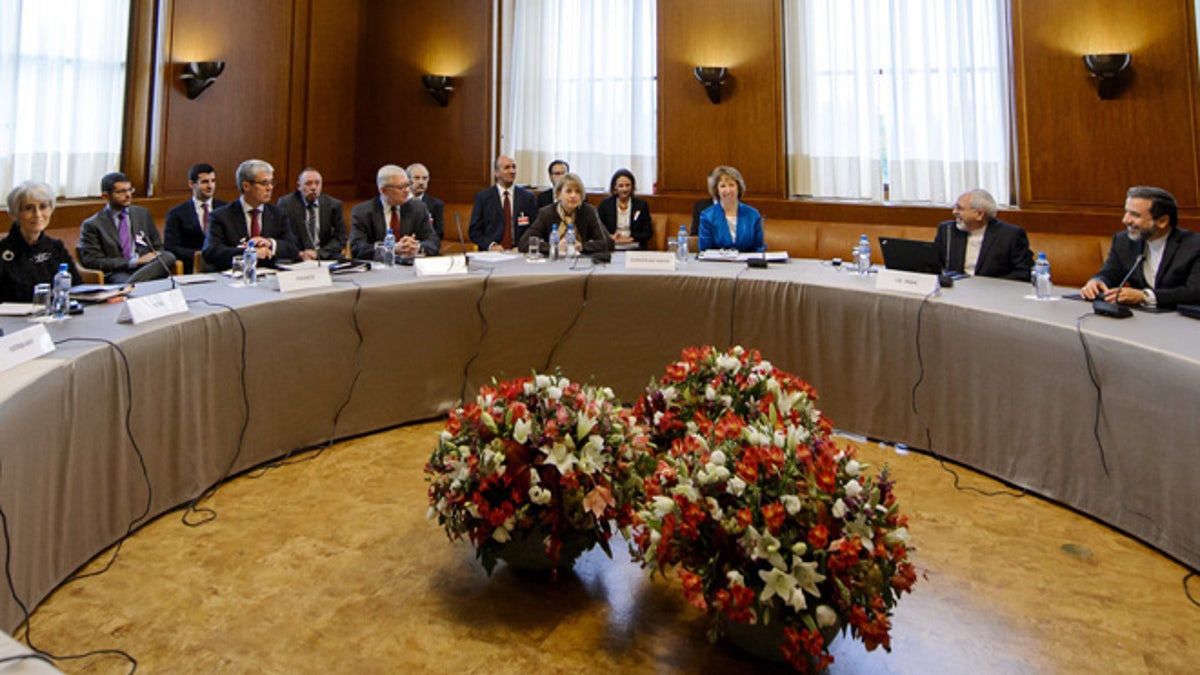White House says Iranian nuclear proposal offers new 'level of seriousness and substance
{{#rendered}} {{/rendered}}
Oct. 15, 2013: A general view prior to the start of the two days of closed-door nuclear talks at the United Nations offices in Geneva, Switzerland. (AP)
A proposal offered by Iran during talks in Geneva over concerns with its nuclear program contained “a level of seriousness and substance that we had not seen before,” the White House says.
White House Spokesman Jay Carney said Wednesday that “no one should expect a breakthrough overnight,” but called Iran’s proposal “useful,” according to Reuters.
The comments came as Iran concluded two days of meetings with officials from the United States, Russia, China, Britain, France and Germany at the U.N.’s offices in Geneva.
{{#rendered}} {{/rendered}}The countries arranged the talks because they suspect Iran is using its nuclear facilities to build weapons, while Iran denies those claims.
Iran, hoping to end the confrontation over its nuclear program, introduced the three-stage proposal to the countries during a PowerPoint presentation on Tuesday morning.
Details on the proposal have remained sparse, but a member of one of the delegations at the talks told the Associated Press that the new Iranian plan offered reductions in both the levels of uranium enrichment being conducted by Iran and the number of centrifuges doing the enrichment — a key demand of the six powers.
{{#rendered}} {{/rendered}}An Iranian official also reportedly suggested Wednesday that Tehran is ready to address concerns about the level of access that International Atomic Energy Agency inspectors get inside the country.
The IRNA news agency asked Iranian Deputy Foreign Minister Abbas Araghchi about uranium enrichment and additional protocols to Iran’s agreement with the IAEA, which would allow inspectors to make unannounced visits outside of nuclear sites to make sure Iran is not conducting any hidden activities, according to Reuters.
World powers have long-asked Iran to implement the protocol, but Iran has said it is voluntary, Reuters reports.
{{#rendered}} {{/rendered}}"Neither of these issues are within the first step [of the Iranian proposal], but form part of our last steps," Araghchi told IRNA, without elaborating.
In return for any changes to its nuclear program, Iran expects the easing of sanctions that have strained its economy.
The talks ended Wednesday on an upbeat note, with the European Union's top diplomat Catherine Ashton calling them "very important."
{{#rendered}} {{/rendered}}She read a statement endorsed by both Iran and the six countries at the negotiations, calling the talks "substantive and forward looking."
A senior U.S. administration official also praised progress made in the talks, despite saying that "there remain many differences in each area."
"I have never had such intense, detailed, straightforward, candid conversations with the Iranian delegation before," the official, who spoke on condition of anonymity, told Reuters.
{{#rendered}} {{/rendered}}Confirming Iranian media reports, the statement says the two sides will meet again in Geneva on Nov. 7-8.
The Associated Press contributed to this report.
